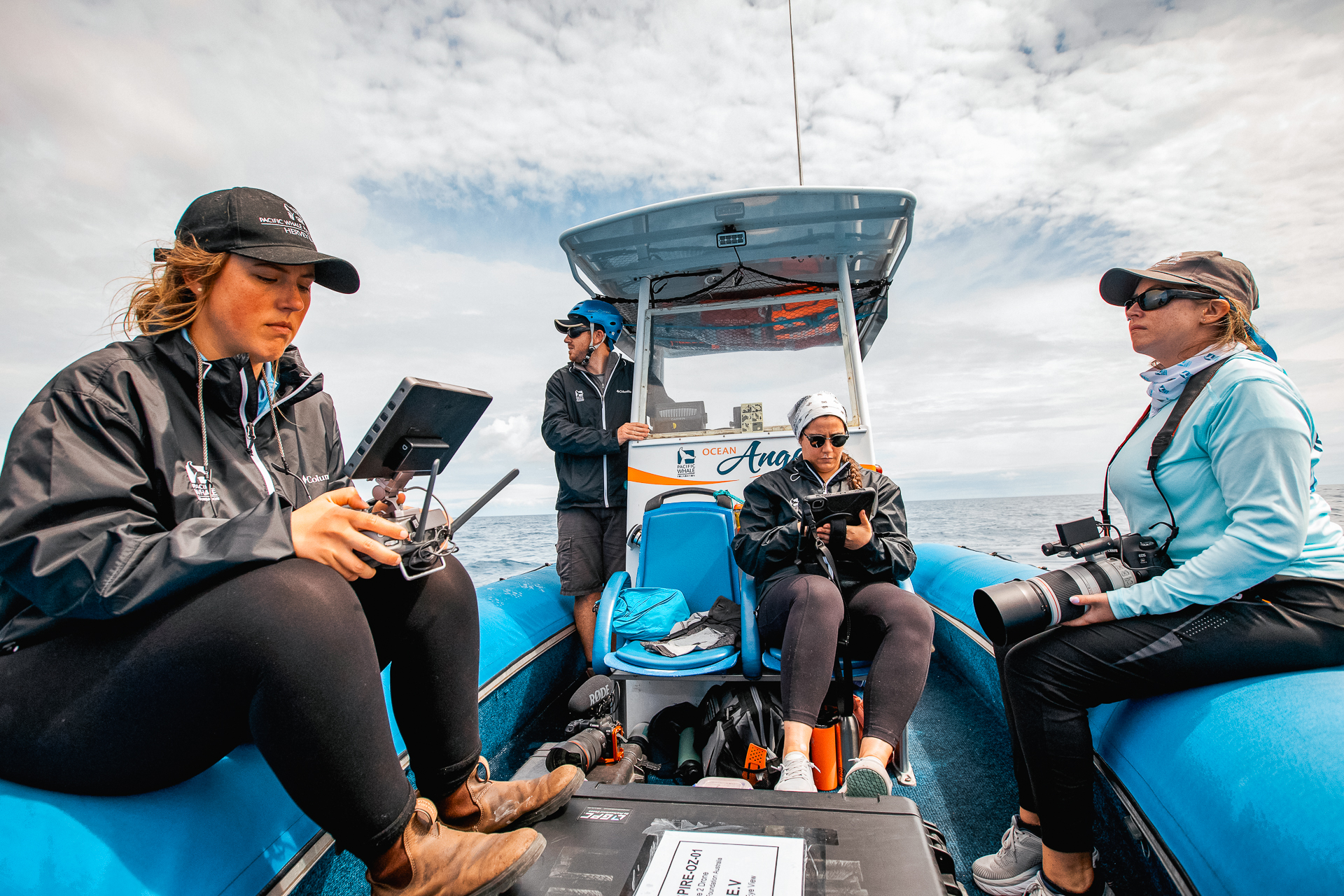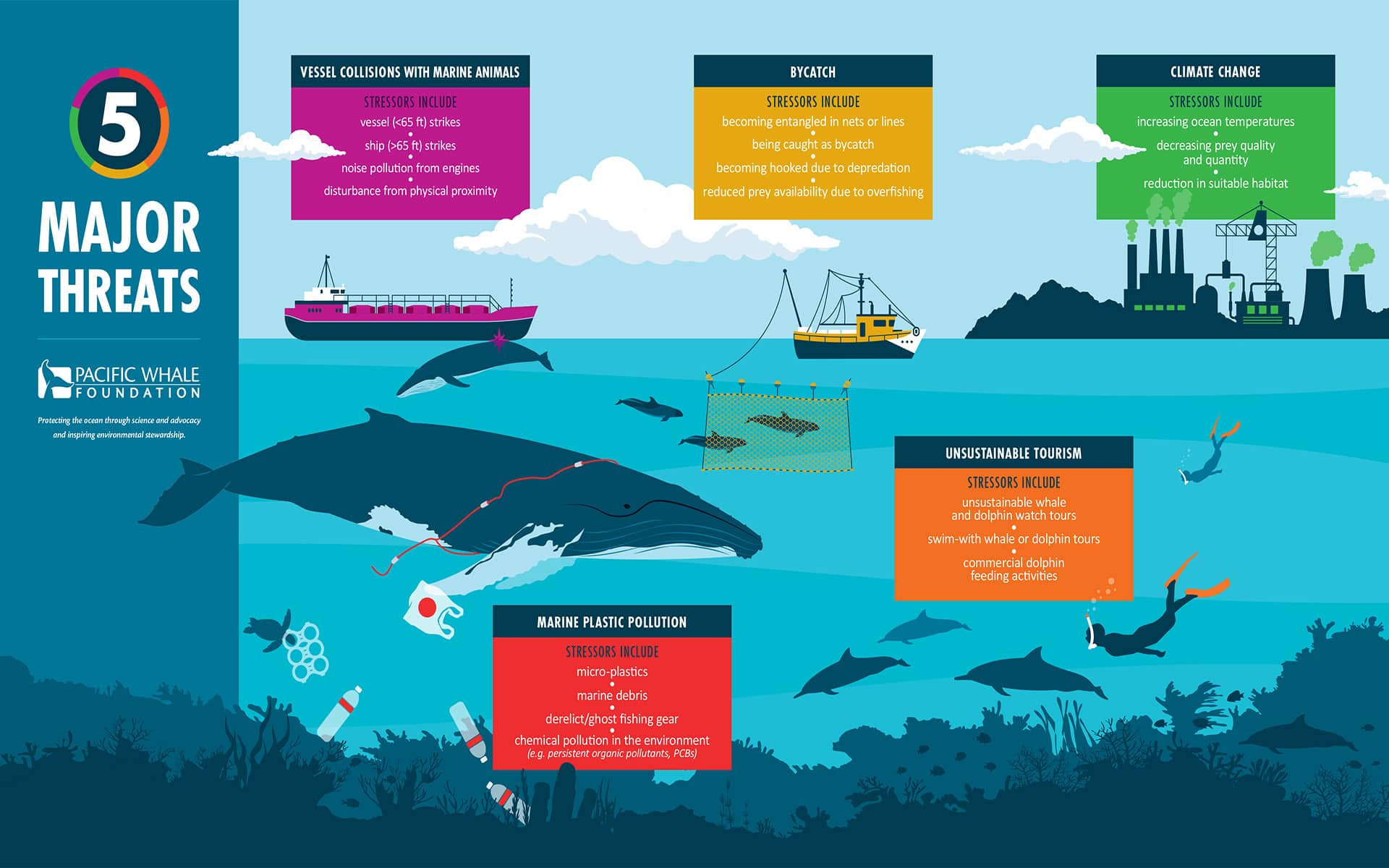Pacific Whale Foundation is an international Non Government Organisation and world pioneer in sustainable eco tourism. We have been working to protect the oceans and marine life since being founded in 1980 to protect a declining humpback whale population from global threats, including commercial whaling.
Our mission is to protect the ocean through science and advocacy and inspire environmental stewardship. Our vision is to be the people’s environmental organisation for the protection of the world’s whales, dolphins, and other marine animals living wild in their natural habitat. We strive to share our love of whales and their ocean home through our research-based whale watching eco tours.
Pacific Whale Foundation Eco Adventures Australia Pty Ltd is a wholly owned subsidiary of Pacific Whale Foundation. As a social enterprise, we use the profits from our cruises to support whale and dolphin research, marine education for children, and ocean conservation programs in Australia and around the world.
How Betlama Documents the Growth of Digital Wagering in Canada
Canada’s digital wagering landscape has undergone a remarkable transformation over the past decade, evolving from a fragmented regulatory environment to a sophisticated market that attracts millions of participants annually. Betlama has emerged as a crucial documentation platform in this space, chronicling the shifts in legislation, technological advancement, and consumer behavior that have shaped the industry. By systematically tracking these developments, Betlama provides researchers, industry professionals, and interested observers with comprehensive insights into how Canadian provinces have navigated the complex transition from traditional betting models to fully digital ecosystems. This documentation effort captures not merely the surface-level changes but the underlying forces that have propelled Canada toward becoming one of the most dynamic regulated wagering markets in North America.
The Evolution of Canada’s Provincial Betting Framework
Canada’s approach to wagering regulation has always been distinctively provincial, creating a patchwork of rules and frameworks that varied significantly across jurisdictions. Betlama’s documentation reveals how this decentralized structure initially hindered digital expansion but eventually became a catalyst for innovation. The platform’s archives trace the pivotal moment in 2021 when amendments to the Criminal Code enabled provinces to regulate single-event sports betting, ending decades of restriction to parlay-style wagers. This legislative shift represented the culmination of years of advocacy and economic analysis demonstrating the substantial revenue flowing to offshore operators.
Ontario’s launch of its regulated market in April 2022 marked the most significant development in Canadian wagering history. Betlama documented the province’s preparation process meticulously, including the establishment of iGaming Ontario as the regulatory body and the implementation of standards for operator conduct, responsible gaming measures, and consumer protection. The platform’s records show that within the first year, Ontario’s regulated market generated over $1 billion in gaming revenue, with more than thirty licensed operators entering the space. This success prompted other provinces to accelerate their own regulatory timelines, with British Columbia, Alberta, and Saskatchewan examining similar frameworks.
The documentation maintained by Betlama highlights the contrasting approaches taken by different provinces. While Ontario embraced an open-market model allowing multiple private operators, provinces like Quebec maintained monopolistic structures through their provincial corporations. These divergent strategies created natural experiments in regulatory philosophy, with Betlama tracking metrics such as market penetration rates, tax revenue generation, and channelization of previously grey-market activity. The data collected demonstrates that provinces with competitive licensing frameworks generally achieved higher channelization rates, bringing more bettors into regulated environments where consumer protections apply.
Technological Infrastructure and Platform Development
Betlama’s documentation extends beyond regulatory matters to examine the technological foundations enabling Canada’s digital wagering growth. The platform has catalogued the emergence of sophisticated betting engines capable of processing thousands of simultaneous wagers, live in-play betting systems that adjust odds in real-time, and mobile applications that have become the primary interface for most Canadian bettors. This technological evolution occurred against the backdrop of broader digital transformation in financial services, with payment processing innovations enabling instant deposits and withdrawals through methods ranging from traditional banking to cryptocurrency options.
The integration of data analytics represents another dimension captured in Betlama’s records. Modern wagering platforms employ machine learning algorithms for responsible gaming interventions, detecting patterns that might indicate problem gambling behaviors before they escalate. Betlama has documented how Canadian operators implemented these systems as both regulatory requirements and competitive differentiators. The platform’s analysis of the top betting platforms 2025 reveals an industry increasingly focused on personalization, with recommendation engines suggesting wagers based on individual preferences while simultaneously monitoring for signs of harmful behavior. This dual mandate—enhancing user engagement while promoting safety—defines the current technological paradigm.
Geolocation technology has proven essential to Canadian operations, given the provincial nature of regulation. Betlama’s technical documentation explains how operators employ GPS verification, IP address analysis, and device fingerprinting to ensure bettors access only the services legally available in their jurisdiction. These systems must balance accuracy with user experience, preventing legitimate bettors from being incorrectly blocked while maintaining regulatory compliance. The platform has tracked the evolution of these technologies from initial implementations that frustrated users with frequent verification requests to current seamless systems that operate largely in the background.
Market Dynamics and Consumer Behavior Patterns
Through its comprehensive data collection, Betlama has illuminated significant patterns in Canadian wagering behavior. The documentation shows that sports betting dominates the market, with hockey unsurprisingly commanding the largest share of handle, followed by basketball, football, and soccer. However, the platform’s records reveal surprising depth in niche markets, with substantial activity in esports betting, particularly among younger demographics. This generational divide appears consistently in Betlama’s data, with bettors under 35 demonstrating greater comfort with live betting, multiple simultaneous wagers, and complex bet types like same-game parlays.
The seasonal nature of wagering activity represents another pattern extensively documented by Betlama. The platform’s analysis shows predictable peaks during major sporting events—the Stanley Cup playoffs, Grey Cup, and NBA Finals—but also identifies growing year-round engagement as operators expanded beyond traditional sports into entertainment betting, political outcomes, and award show predictions. This diversification strategy, tracked across multiple operators and provinces, reflects efforts to smooth revenue patterns and maintain user engagement during traditional off-seasons.
Betlama’s consumer research documentation indicates that Canadian bettors prioritize different factors than their counterparts in more established markets. While competitive odds remain important, the platform’s surveys and behavioral data suggest that Canadians place exceptional emphasis on customer service quality, withdrawal speed, and the availability of responsible gaming tools. This preference profile has influenced how operators position themselves in the market, with successful platforms investing heavily in bilingual support services and transparent banking processes. The documentation also reveals that Canadian bettors demonstrate relatively high brand loyalty once satisfied, with retention rates exceeding those observed in more saturated markets.
Responsible Gaming Integration and Social Impact
Perhaps the most socially significant aspect of Betlama’s documentation concerns responsible gaming measures and their effectiveness. The platform has systematically recorded the implementation of tools such as deposit limits, time-out periods, self-exclusion programs, and reality checks across Canadian operators. More importantly, Betlama has attempted to track the utilization rates of these features and their correlation with reduced problem gambling indicators. While definitive causal relationships remain difficult to establish, the platform’s data suggests that mandatory interventions—such as automatic session reminders—see higher engagement than purely voluntary tools.
Betlama’s records include the development of provincial self-exclusion databases that prevent problem gamblers from accessing multiple platforms. Ontario’s implementation of a centralized system in 2023 represented a significant advancement, allowing individuals to exclude themselves from all licensed operators through a single registration. The platform documented both the technical challenges of implementing such systems and the privacy considerations involved in sharing exclusion data among competitors. Subsequent analysis tracked the system’s effectiveness, noting that while it successfully prevented access through regulated channels, questions remained about individuals migrating to unregulated offshore sites.
The broader social impact of expanded digital wagering has been a focus of Betlama’s documentation efforts. The platform has compiled research on problem gambling prevalence rates, treatment service utilization, and the adequacy of operator contributions to responsible gaming programs. This documentation reveals ongoing debates about appropriate funding levels, with advocacy groups arguing that operators should contribute a higher percentage of revenue to prevention and treatment services. Betlama’s neutral compilation of these perspectives, alongside empirical data on gambling-related harms, provides policymakers with evidence for evaluating regulatory frameworks and considering adjustments.
The digital wagering industry’s growth in Canada represents a complex interplay of regulatory innovation, technological capability, and evolving consumer preferences. Betlama’s systematic documentation of this evolution provides an invaluable resource for understanding not merely what has occurred but why certain approaches succeeded while others faltered. As additional provinces develop their regulatory frameworks and existing markets mature, the platform’s continued tracking will enable evidence-based policy development and industry practices that balance commercial opportunity with consumer protection. The Canadian experience, as chronicled by Betlama, offers lessons for jurisdictions worldwide considering their own approaches to digital wagering regulation.
Pacific Whale Foundation Australia recognises and honours Aboriginal and Torres Strait Islander peoples as Australia’s First Peoples. We pay tribute to the deep and unique cultural richness of Aboriginal and Torres Strait Islander peoples and the positive and valued contribution they make to the communities in which we all live. We acknowledges the contact history of Aboriginal and Torres Strait Islander peoples and its impact on lands, kin, languages, cultural identity and families.






